Add more Manuka to your routine with our CBD + Manuka Honey range
Try our high-quality CBD range today.
SHOP NOWManuka Pharm honey is high quality, genuine Manuka Honey that is naturally and responsibly sourced in New Zealand.
 Sale
Sale
An everyday grade with anti-microbial properties from MGO.
£13.30 was £37.99
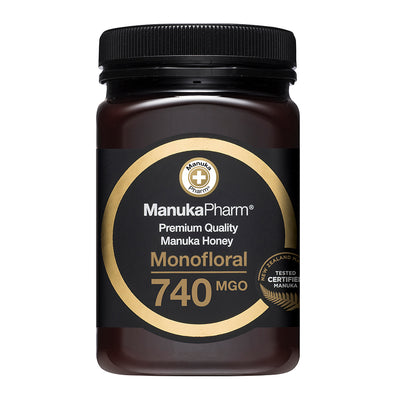 Sale
Sale
Our highest strength Manuka Honey available! In a large 500g Pot.
£46.20 was £131.99
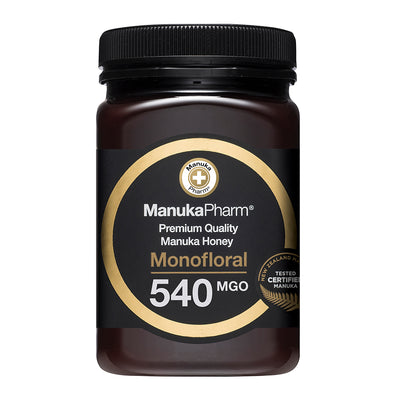 Sale
Sale
A higher grade with more anti-microbial MGO.
£38.50 was £109.99
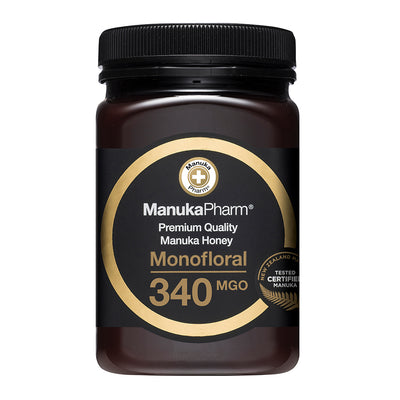 Sale
Sale
A higher grade with more anti-microbial MGO.
£28.70 was £81.99
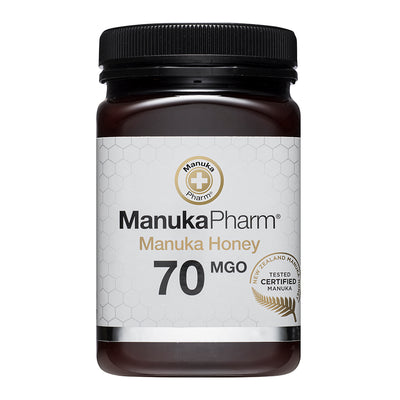 Sale
Sale
An everyday grade with anti-microbial properties from MGO.
£15.75 was £44.99
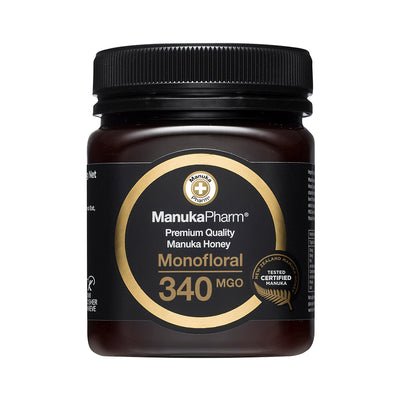
A higher grade with more anti-microbial MGO.
£45.99
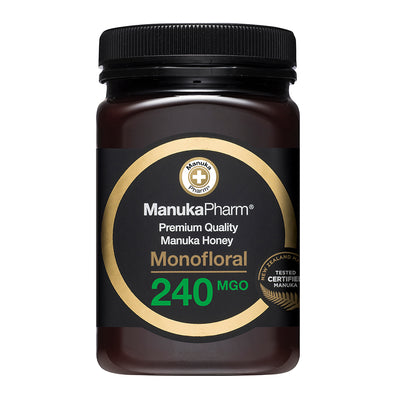 Sale
Sale
A higher grade with more anti-microbial MGO.
£25.20 was £71.99
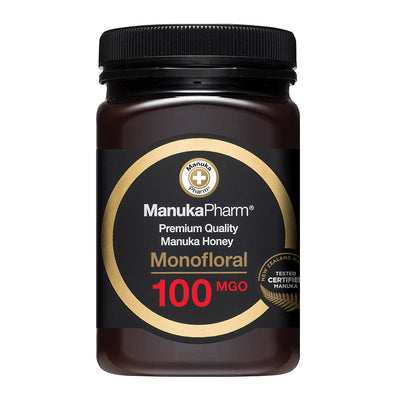 Sale
Sale
A higher grade with more anti-microbial MGO.
£18.90 was £53.99
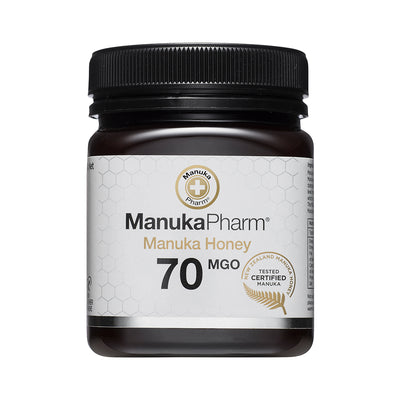
An everyday grade with anti-microbial properties from MGO.
£24.99
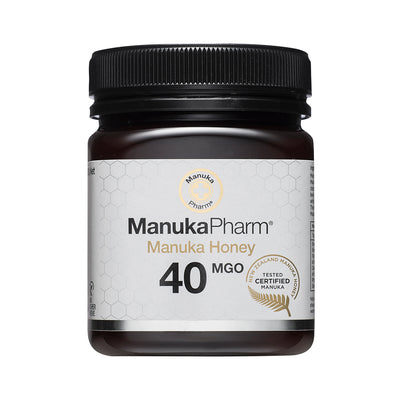
An everyday grade with anti-microbial properties from MGO.
£18.99
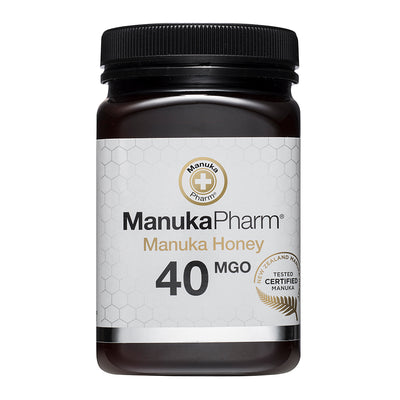 Sale
Sale
An everyday grade with anti-microbial properties from MGO.
£11.90 was £33.99
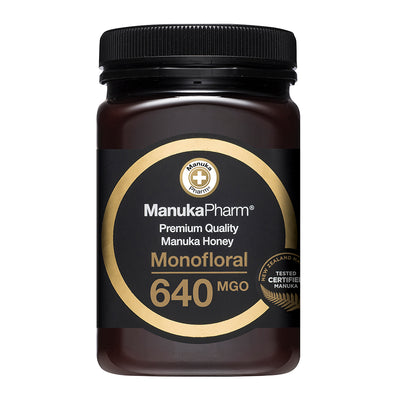 Sale
Sale
A great starting point to try Max Strength Manuka. In a large 500g Pot.
£42.70 was £121.99
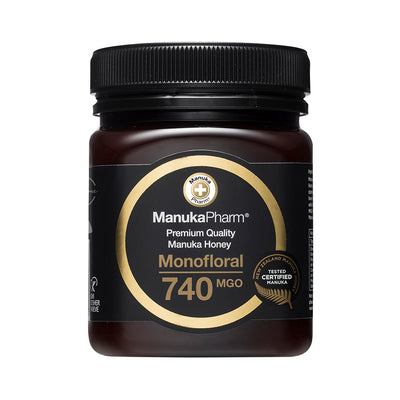
Our highest strength Manuka Honey available on our website!
£72.99
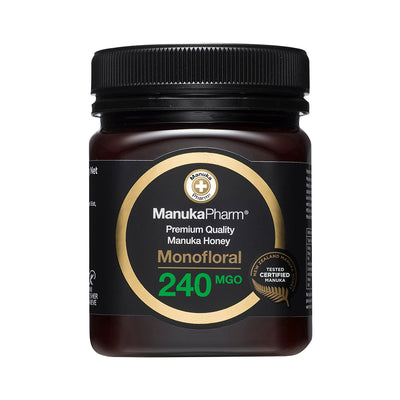
A higher grade with more anti-microbial MGO.
£38.99
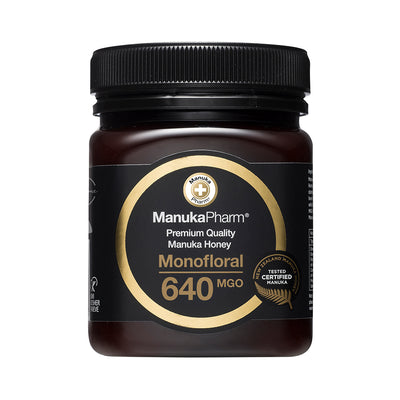
A great starting point to try Max Strength Manuka.
£66.99

A higher grade with more anti-microbial MGO.
£59.99
Try our high-quality CBD range today.
SHOP NOW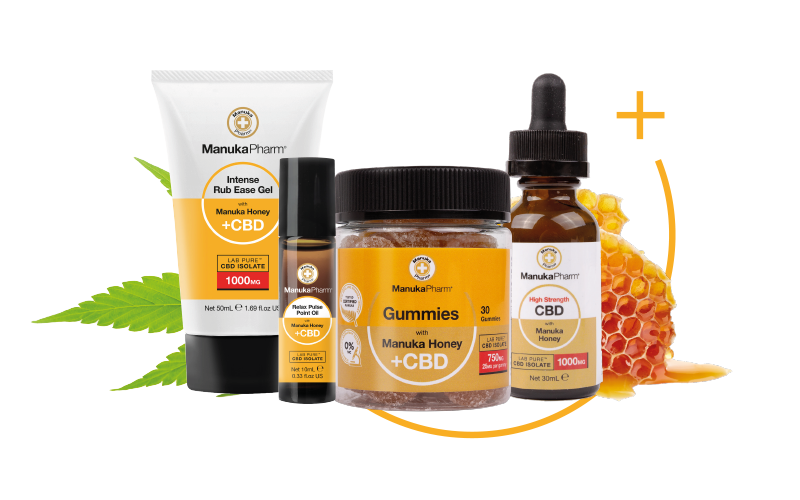
The strength of Manuka Pharm’s Manuka honey is measured using the MGO (Methylglyoxal) grading system from 40 MGO to 740 MGO. Scientists generally agree that MGO is the best way to establish a honey’s antimicrobial (bacteria killing) strength. At Manuka Pharm we test each batch of honey twice, once in New Zealand and again in the UK, to ensure the MGO rating is true to label. When deciding on which Manuka Honey to buy, the greater the number, the stronger the antimicrobial activity.
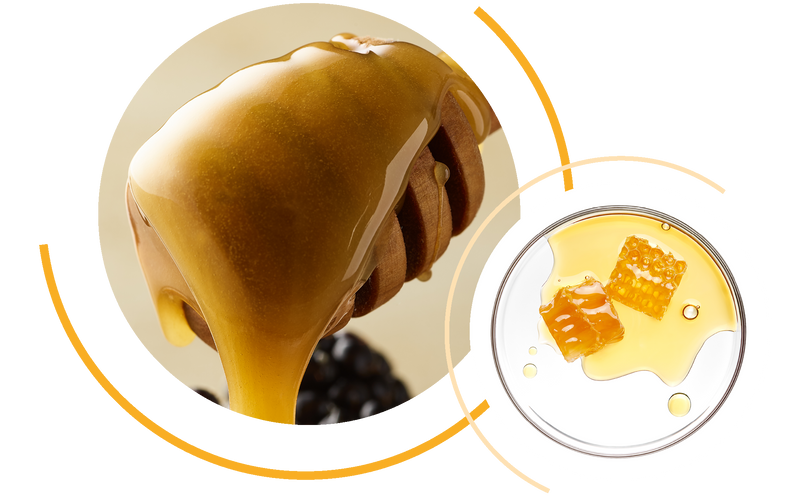
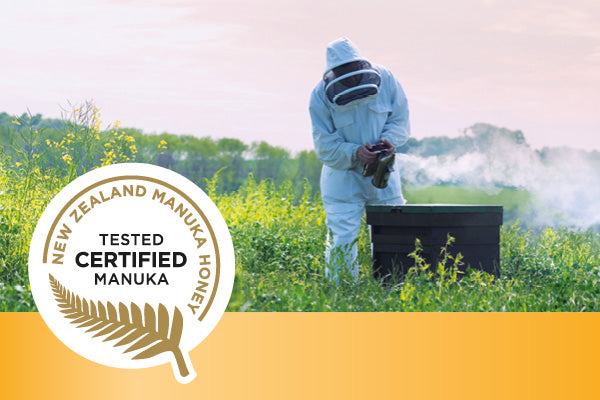
All Manuka Honey exported from New Zealand has to meet the strict requirements of the New Zealand Government to ensure it is genuine. Government scientists have identified four chemicals and a DNA marker which are unique to New Zealand Manuka Honey [1] – and each batch must be tested to ensure it contains certain levels of these five elements before it can be sold to UK customers [2].
At Manuka Pharm, we put this Government Standard on the lid of every jar when it is packed in New Zealand so you can be confident you are buying a genuine, authentic Manuka Honey, that has been created at source and shipped to the UK in the same jar.
1. McDonald C M, Keeling Z E, et al. Using chemical and DNA marker analysis to authenticate a high-value food, manuka honey. npj Science of Food. 2018;2:9. https://www.nature.com/articles/s41538-018-0016-6 2. Ministry for Primary Industries. Manuka Honey. https://www.mpi.govt.nz/growing-and-harvesting/honey-and-bees/manuka-honey/
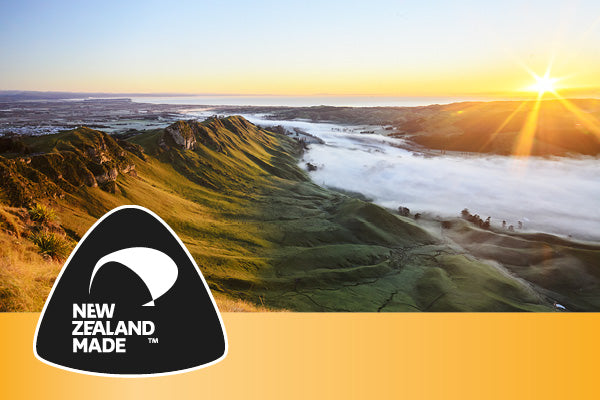
Sadly like many expensive and rare products, Manuka Honey is also subject to copies and passing off.
Some dishonest companies have been caught either diluting their Manuka Honey with cheaper European honey outside of New Zealand, or artificially adding chemicals to make their Manuka appear stronger than it once was.
We are in support of the New Zealand Government’s MPI standard of Manuka, and all of our products are packed in New Zealand itself, meaning once the jars are sealed there is no change to your product from New Zealand to your home.
Remember to look for "packed in New Zealand" on the label, and buy from a trusted brand who tests its products before sale.
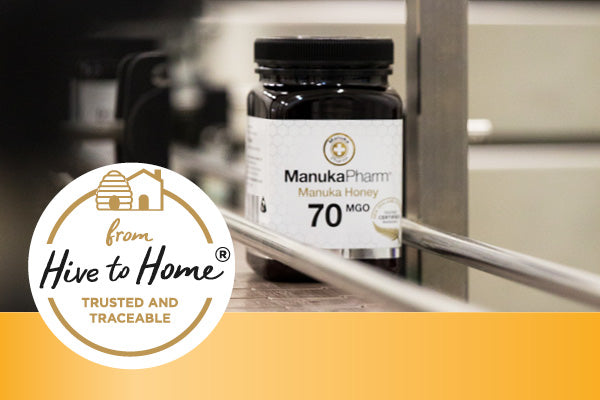
Manuka Pharm is a privately owned family company based in Auckland, New Zealand with origins that can be traced back to 1901. We are one of the main exporters of genuine Manuka Honey from New Zealand and the Manuka Pharm brand is sold across the world.
Our base in Leicestershire means we can supply customers in the UK easily and quickly via mail order and telephone, plus we also supply the UK’s biggest health-food chain Holland & Barrett.
Manuka Pharm is proud to be a New Zealand owned company that oversees 60,000 individual bee hives in the North and South islands, spanning over 11,000 hectares of land, all owned by our founder.
This means that we can trace every single batch of honey right back to the hive site where it was created.
And after laboratory testing to ensure purity and strength, we pack every pot of Manuka Honey in New Zealand itself before products are exported to the UK.
Once in the UK, we test every batch of honey a second time at a Government laboratory in York to ensure every MGO rating is true to label before sale.
We call this unique supply chain trusted and traceable from Hive to Home.
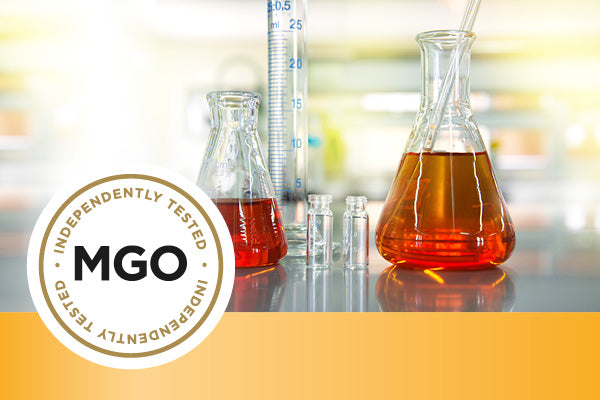
The number on the front of the pot represents the mg per kg of MGO (Methylglyoxal) and the related strength of Antimicrobial Activity, which is known to kill certain types of bacteria. The greater the number, the stronger the Antimicrobial Activity.
MGO is related to the strength of the Manuka Honey. The strength of Manuka Pharm honey is measured using the MGO grading system from 30 MGO to 1000 MGO. Scientists generally agree that MGO is the best way to establish a honey’s antimicrobial (bacteria killing) strength.
So put simply, the MGO number refers to the amount of methylglyoxal per kilogram. For example Manuka Pharm 340 MGO has 340mg per kg of MGO in the pot.
What is Methylglyoxal in Honey? MGO in Manuka Honey is derived from dihydroxyacetone (DHA) which is naturally present in the nectar of the Manuka Bush. Within the hive DHA undergoes the Maillard reaction to form MGO, a process which is driven by the higher temperatures found within bee hives.
What MGO level do I need? See below our guide to Manuka Honey Strengths.
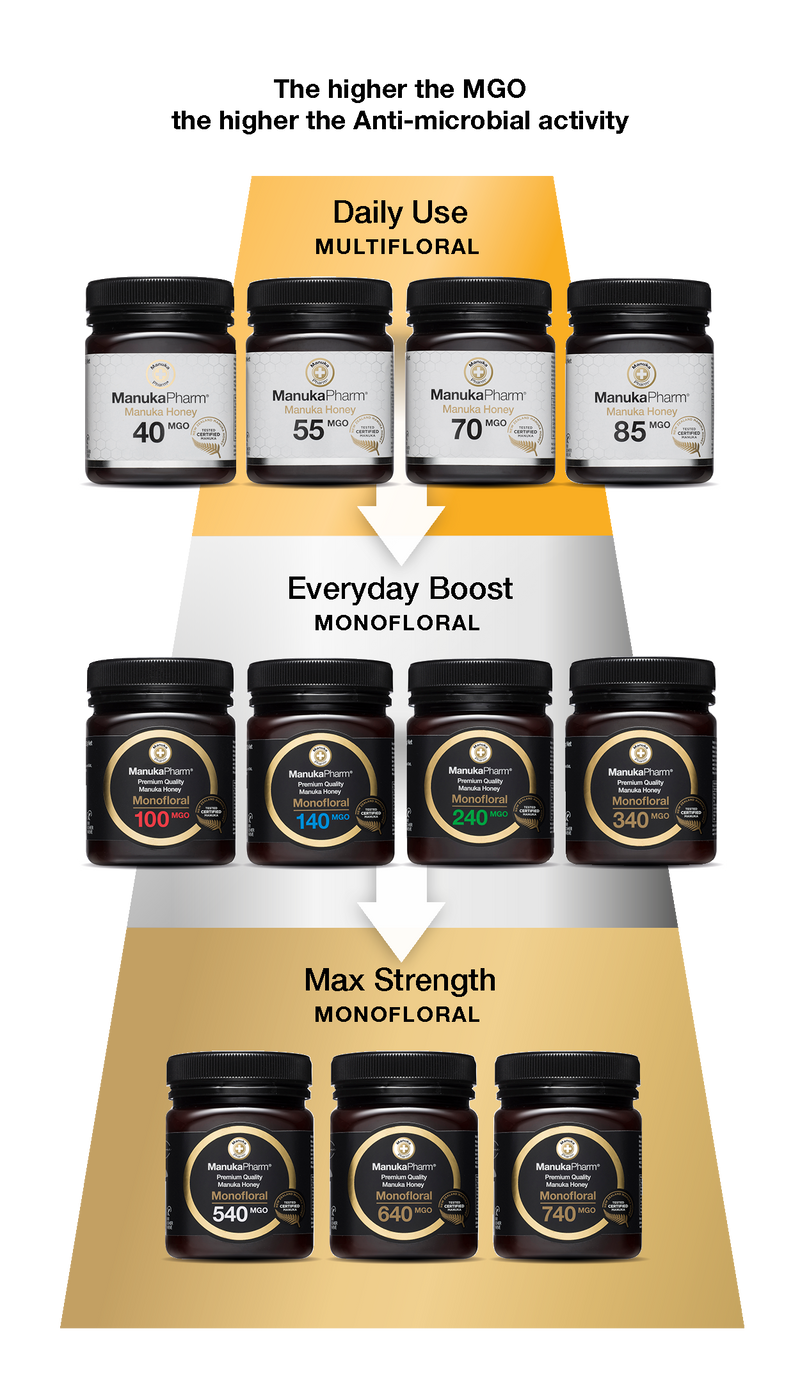
Under New Zealand law there are two classifications of Manuka Honey.
MULTIFORAL Manuka means bees visited the Manuka bush as well as other floral sources near to the hive to produce the honey. To be classified as Multifloral, the honey must contain ‘wholly or mainly’ Manuka nectar above any other source plus meet four naturally occurring markers and a pollen test. Our Multifloral Manuka Honey has an MGO of between 30 and 70.
MONOFLORAL Manuka Honey is produced by bees who predominantly collected nectar from the Manuka bush itself. To be called Monofloral, the honey must meet a higher level of two of the four naturally occurring markers and meet the pollen test. Some batches of Monofloral Manuka Honey from the most remote regions of New Zealand can have an MGO rating of 840, making it extremely rare and special find.
Some brands use different grading systems where several chemical markers are combined to give a new number, for example 15+. Often the amount of MGO is a factor in determining these rankings.
When shopping for your Manuka Honey look for the 'New Zealand Made' logo on the side of the pot.
An antimicrobial is an agent that kills micro-organisms or stops their growth.
The primary difference between antibacterial and antimicrobial substances is the types of micro-organism they act upon. While antibacterial products prevent the development of bacteria, Antimicrobial products have the ability to kill or slow the spread of microorganisms, which may include bacteria, parasites, or fungis.
Merilyn Manley-Harris, associate professor of organic and analytical chemistry at the University of Waikato, New Zealand, says: "MGO is an antibacterial agent and research shows it is very difficult for bacteria to develop immunity to it because it has multiple methods of action.
"The slightly bitter taste of Manuka Honey is because it’s also quite high in phenolic acids, which are antioxidants."
New Zealand FernMark Licence Programme. Licence No. 100241
The Silver Fern is one of New Zealand's most recognised, long-standing, and respected national symbols. To carry the FernMark logo, a business needs to show that they reflect the essence of the country by being registered in New Zealand, compliant with all New Zealand laws and relevant regulations and have a substantial level of New Zealand ownership, governance and full time employees. We are proud to say Manuka Pharm meets all of these criteria to be a registered FernMark brand that you can trust.